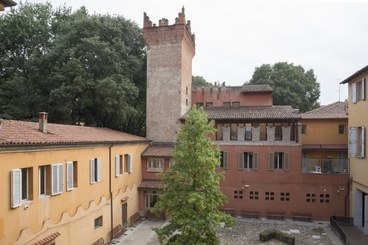Political support and anti-liberal attitudes in pandemic times. Evidence from Western Europe
Nicola Maggini (University of Bologna) presents his research on the political impacts of the Covid-19 pandemic in Western Europe.

-
Date: 11 FEBRUARY 2025 from 13:00 to 14:00
-
Event location: Aula Romei, Palazzo Hercolani, Strada Maggiore 45, Bologna
-
Type: CONNECT seminars
In this talk, Nicola Maggini (Unibo) will present findings from his ongoing research project on “Social Change in COVID-19 times”, which investigates the impacts of the Covid-19 pandemic on citizens' political attitudes in four western European countries. The discussant will be Prof. Alice Mattoni.
Talk Abstract
The COVID-19 pandemic has triggered an unprecedented crisis, profoundly affecting societies, economies, and political systems. Since early 2020, it was immediately clear that the COVID-19 pandemic exposed vulnerabilities within democratic societies, while simultaneously testing the resilience of societal values and attitudes towards political institutions. In this regard, a large body of research focused on changes in public attitudes towards decision-makers, institutions, and political systems in different phases of the pandemic. A special investigation was devoted to confidence in political institutions and its consequences in terms of risk perception, compliance, vaccination, and other COVID-related outcomes (for a review, see Devine et al., 2020; 2024). The importance of political confidence, during times of crisis, especially lies in its function as a heuristic, serving to mitigate complexity and uncertainty (Siegrist and Zingg, 2014; Hooghes and Zmerli, 2011; van der Meer, 2017; Citrin & Stoker, 2018). Some scholars have pointed out that the short-term “rally ‘round the flag” effect might hide the erosion of support for democratic institutions in favour of anti-liberal decisions (Roccato et al., 2020; Pedrazzani et al., 2021; Erhardt et al., 2023) during the pandemic. In general, the COVID-19 pandemic has served as fertile ground for the resurgence of anti-liberal values within European liberal democracies. It is noteworthy that this occurred within a context where Europeans have increasingly supported both the demand for state regulation and the demand for equality over the last few decades (Gonthier, 2017).
Within such a framework, our study aims first at analysing the dynamics of political support across the different phases of the pandemic in four western European countries (France, Germany, Italy, and the United Kingdom). Then, we will explore the role of party preferences in explaining institutional confidence and support for government in Italy and Germany during the pandemic. During the first phase of the pandemic, characterized by high emergency and marginal politicization of the COVID-19 issue, we could expect an increase at the aggregate level of both institutional confidence and government support to such an extent as to cross-cut party preferences, meaning that several supporters of parties of different type (left-wing or right-wing, government or opposition) trust institutions and approve governmental action. Accordingly, we will provide answers to the following research questions: was the association between party preferences and political support weaker during such phase? And what about such association in the following phases of the pandemic? Overall, our preliminary results on the Italian case show that COVID-19 did not represent an exceptional event in which the level of political support was unrelated to party preference. Although a rally ‘round the flag effect characterized the initial phase of the pandemic, it did not shrink the differences in the level of political support. Contextual factors related to the unfolding of the pandemic affected the overall dynamics of political support (e.g. the beginning of the vaccination campaign), but they did not significantly impact the relationship between party preference and political support. Instead, our results suggest that the impact of the political context overshadowed the impact of the pandemic context in shaping the relationship between party preference and political support in Italian public opinion during the COVID-19 pandemic. Moreover, the study will test whether and to what extent the COVID-19 pandemic impacted on anti-liberals attitudes in France, Germany, and Italy. Results reveal that people in all three countries demonstrated high support for anti-liberal proposals during the first weeks of the pandemic in March and April 2020. They then substantially decreased their favourability. We interpret this temporal pattern as a reflection of the sudden uncertainty that affected people across the socioeconomic spectrum, but which was perhaps quickly managed as governments took a “whatever it costs” approach to financing social protections.
Presenter's Short Bio
Nicola Maggini is a Tenured Assistant Professor in Political Science at the Department of Political and Social Sciences of the University of Bologna. He is also a member of the scientific council of ITANES (Italian National Election Study), CISE (Italian Center for Electoral Studies), and the research laboratory spsTREND. His main research interests are socio-political attitudes and behaviors, electoral systems, voting behavior, and party competition in a comparative perspective. After obtaining his Ph.D. in Political Science from the Italian Institute of Human Sciences, Nicola conducted research and/or teaching activities at the University of Milan, the Schuman Centre for Advanced Studies at the European University Institute, the University of Florence, LUISS Guido Carli University in Rome, New York University (Florence), and Middlebury College (Florence)